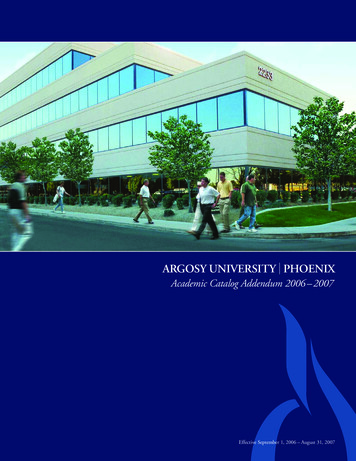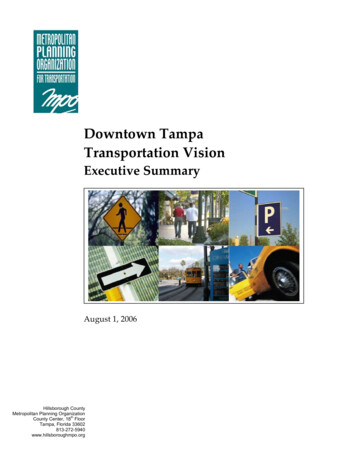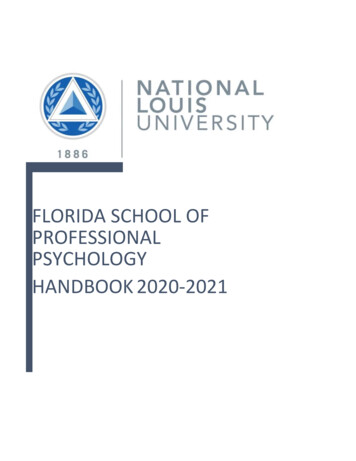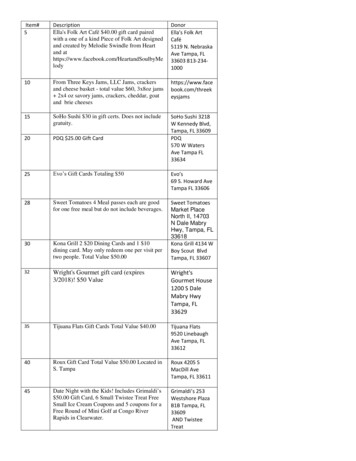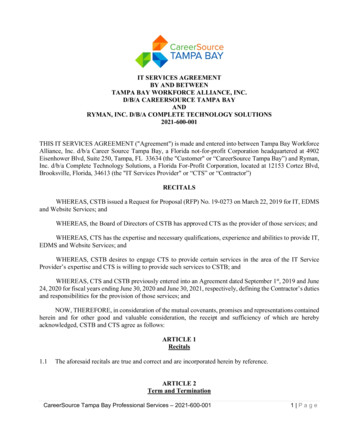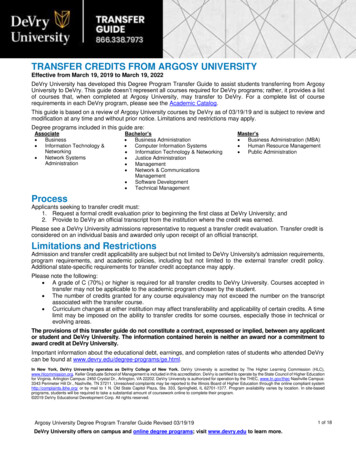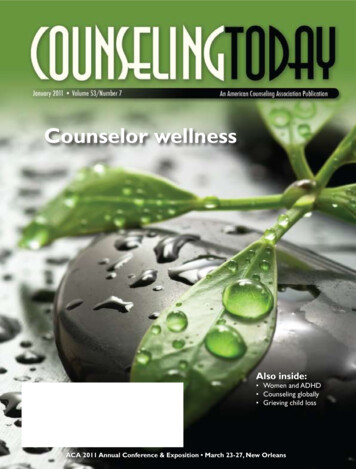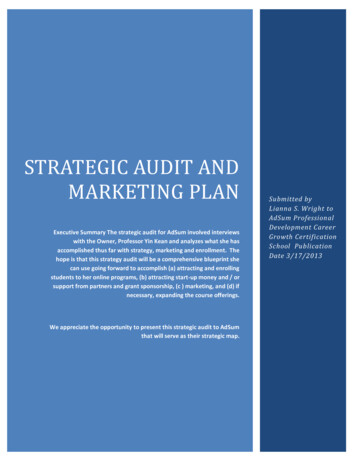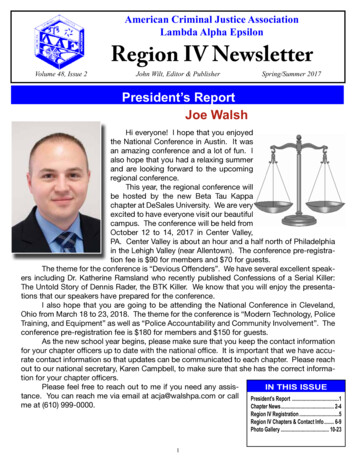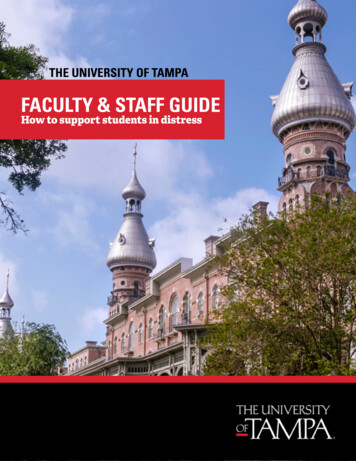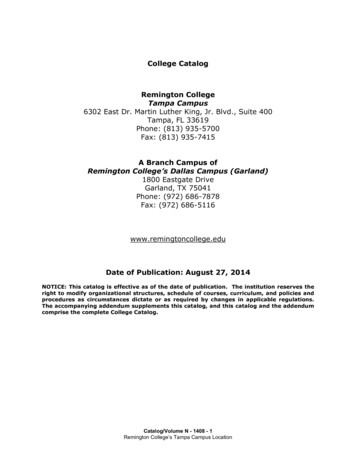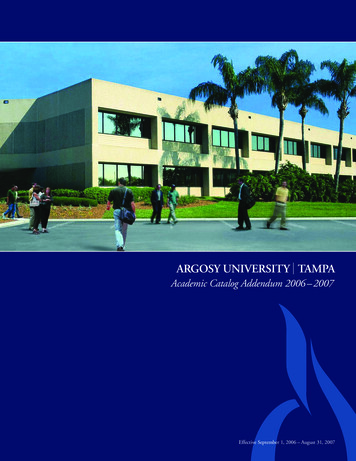
Transcription
ARGOSY UNIVERSITY TAMPAAcademic Catalog Addendum 2006 – 2007Effective September 1, 2006 – August 31, 2007
This catalog was prepared by Argosy University, Two First National Plaza, 20 South Clark Street Chicago, Illinois 60603. The informationcontained herein applies to the academic years 2006 – 2007. Curriculum, fees, expenses and other information described herein, while currentat the time of publication, are subject to change without notice at the discretion of Argosy University. For more information, write to theabove address or phone 1.800.377.0617.
Table of ContentsSection OneSection FourAccreditation and ProgramsMaster of Arts in Marriage & Family Counseling ProgramCampus Description . . . . . . . . . . . . . . . . . . . . . . . . . . . . . . . . . . . . . . . . . . . . . .3Program Overview . . . . . . . . . . . . . . . . . . . . . . . . . . . . . . . . . . . . . . . . . . . . . . . . 19Institutional Accreditation . . . . . . . . . . . . . . . . . . . . . . . . . . . . . . . . . . . . . . . . .3Admission Requirements . . . . . . . . . . . . . . . . . . . . . . . . . . . . . . . . . . . . . . . . . . 19State Licensing . . . . . . . . . . . . . . . . . . . . . . . . . . . . . . . . . . . . . . . . . . . . . . . . . .3Enrollment Requirements . . . . . . . . . . . . . . . . . . . . . . . . . . . . . . . . . . . . . . . . . . 20Programmatic Accreditation . . . . . . . . . . . . . . . . . . . . . . . . . . . . . . . . . . . . . . . .3Graduation Requirements . . . . . . . . . . . . . . . . . . . . . . . . . . . . . . . . . . . . . . . . . . 21Argosy University/Tampa Programs . . . . . . . . . . . . . . . . . . . . . . . . . . . . . . . . . .3Writing Program . . . . . . . . . . . . . . . . . . . . . . . . . . . . . . . . . . . . . . . . . . . . . . . . . 21Scholarly Writing Policy . . . . . . . . . . . . . . . . . . . . . . . . . . . . . . . . . . . . . . . . . . .4Program Requirements . . . . . . . . . . . . . . . . . . . . . . . . . . . . . . . . . . . . . . . . . . . . 21Recommended Course Sequence for theMaster of Arts in Marriage & Family Therapy Program . . . . . . . . . . . . . . . . 23The Florida School of Professional PsychologySection TwoMaster of Arts in Clinical Psychology ProgramCourse/Credit Transfer . . . . . . . . . . . . . . . . . . . . . . . . . . . . . . . . . . . . . . . . . . . . 24Program Overview . . . . . . . . . . . . . . . . . . . . . . . . . . . . . . . . . . . . . . . . . . . . . . . .7Admission Requirements . . . . . . . . . . . . . . . . . . . . . . . . . . . . . . . . . . . . . . . . . .7Enrollment Requirements . . . . . . . . . . . . . . . . . . . . . . . . . . . . . . . . . . . . . . . . . .8Graduation Requirements . . . . . . . . . . . . . . . . . . . . . . . . . . . . . . . . . . . . . . . . . .8Writing Program . . . . . . . . . . . . . . . . . . . . . . . . . . . . . . . . . . . . . . . . . . . . . . . . .9Program Requirements . . . . . . . . . . . . . . . . . . . . . . . . . . . . . . . . . . . . . . . . . . . .9Recommended Course Sequence for the Master of Arts inClinical Psychology Program—Three-Year Curriculum . . . . . . . . . . . . . . . . . 11Master of Arts in Clinical Psychology ProgramCourse Prerequisites . . . . . . . . . . . . . . . . . . . . . . . . . . . . . . . . . . . . . . . . . . . . . 12Student Professional Development Committee andStudent Conduct Committee . . . . . . . . . . . . . . . . . . . . . . . . . . . . . . . . . . . . . . 12Section FiveMaster of Arts in Mental Health Counseling ProgramProgram Overview . . . . . . . . . . . . . . . . . . . . . . . . . . . . . . . . . . . . . . . . . . . . . . . . 25Admission Requirements . . . . . . . . . . . . . . . . . . . . . . . . . . . . . . . . . . . . . . . . . . 25Enrollment Requirements . . . . . . . . . . . . . . . . . . . . . . . . . . . . . . . . . . . . . . . . . . 26Graduation Requirements . . . . . . . . . . . . . . . . . . . . . . . . . . . . . . . . . . . . . . . . . . 27Writing Program . . . . . . . . . . . . . . . . . . . . . . . . . . . . . . . . . . . . . . . . . . . . . . . . . 27Program Requirements . . . . . . . . . . . . . . . . . . . . . . . . . . . . . . . . . . . . . . . . . . . . 27Recommended Course Sequence for theMaster of Arts in Mental Health Counseling Program . . . . . . . . . . . . . . . . . 30Course/Credit Transfer . . . . . . . . . . . . . . . . . . . . . . . . . . . . . . . . . . . . . . . . . . . . 30Faculty Advisors . . . . . . . . . . . . . . . . . . . . . . . . . . . . . . . . . . . . . . . . . . . . . . . . . 12Clinical Practice Policy . . . . . . . . . . . . . . . . . . . . . . . . . . . . . . . . . . . . . . . . . . . . 12Section SixDoctor of Psychology in Clinical Psychology ProgramStudent Practice Assessment . . . . . . . . . . . . . . . . . . . . . . . . . . . . . . . . . . . . . . . 13Program Overview . . . . . . . . . . . . . . . . . . . . . . . . . . . . . . . . . . . . . . . . . . . . . . . . 31Course/Credit Transfer . . . . . . . . . . . . . . . . . . . . . . . . . . . . . . . . . . . . . . . . . . . . 13Admission Requirements . . . . . . . . . . . . . . . . . . . . . . . . . . . . . . . . . . . . . . . . . . 31Section ThreeEnrollment Requirements . . . . . . . . . . . . . . . . . . . . . . . . . . . . . . . . . . . . . . . . . . 32Master of Arts in School Counseling ProgramGraduation Requirements . . . . . . . . . . . . . . . . . . . . . . . . . . . . . . . . . . . . . . . . . . 33Program Overview . . . . . . . . . . . . . . . . . . . . . . . . . . . . . . . . . . . . . . . . . . . . . . . . 14Writing Program . . . . . . . . . . . . . . . . . . . . . . . . . . . . . . . . . . . . . . . . . . . . . . . . . 33Admission Requirements . . . . . . . . . . . . . . . . . . . . . . . . . . . . . . . . . . . . . . . . . . 14Program Requirements . . . . . . . . . . . . . . . . . . . . . . . . . . . . . . . . . . . . . . . . . . . . 33Enrollment Requirements . . . . . . . . . . . . . . . . . . . . . . . . . . . . . . . . . . . . . . . . . . 15Recommended Course Sequence for theDoctor of Psychology in Clinical Psychology Program—Five-Year Curriculum: General/No Specified Concentration . . . . . . . . . . . . . 37Graduation Requirements . . . . . . . . . . . . . . . . . . . . . . . . . . . . . . . . . . . . . . . . . . 16Writing Program . . . . . . . . . . . . . . . . . . . . . . . . . . . . . . . . . . . . . . . . . . . . . . . . . 16Program Requirements . . . . . . . . . . . . . . . . . . . . . . . . . . . . . . . . . . . . . . . . . . . . 16Doctor of Psychology in Clinical Psychology ProgramCourse Prerequisites . . . . . . . . . . . . . . . . . . . . . . . . . . . . . . . . . . . . . . . . . . . . . 38Recommended Course Sequence for theMaster of Arts in School Counseling Program . . . . . . . . . . . . . . . . . . . . . . . . 18Concentrations in theDoctor of Psychology in Clinical Psychology Program . . . . . . . . . . . . . . . . . . 39Course/Credit Transfer . . . . . . . . . . . . . . . . . . . . . . . . . . . . . . . . . . . . . . . . . . . . 18Student Professional Development Committee andStudent Conduct Committee . . . . . . . . . . . . . . . . . . . . . . . . . . . . . . . . . . . . . . 39Faculty Advisors . . . . . . . . . . . . . . . . . . . . . . . . . . . . . . . . . . . . . . . . . . . . . . . . . 39Clinical Practice Policy . . . . . . . . . . . . . . . . . . . . . . . . . . . . . . . . . . . . . . . . . . . . 39Policy Regarding Appropriate Subjectsfor Student Practice Assessment Informed Consent . . . . . . . . . . . . . . . . . . . 39Course/Credit Transfer . . . . . . . . . . . . . . . . . . . . . . . . . . . . . . . . . . . . . . . . . . . . 40Argosy University/Tampa Academic Catalog Addendum 2006 – 20071
Appendix ISchedule of Tuition and Fees . . . . . . . . . . . . . . . . . . . . . . . . . . . . . . . . . . . . . . . 41Appendix IIFaculty Descriptions . . . . . . . . . . . . . . . . . . . . . . . . . . . . . . . . . . . . . . . . . . . . . . 432Argosy University/Tampa Academic Catalog Addendum 2006 – 2007
Section OneAccreditation and ProgramsThe information listed in this addendum applies to the Argosy University Academic Catalog 2006 – 2007. To ensure that this information isapplied to the proper publication please refer to the effective date, September 1, 2006 – August 31, 2007 on the front cover of the AcademicCatalog. If you have questions related to information this addendum, please contact your academic advisor or program chair for assistance.ARGOSY UNIVERSITY/TAMPASTATE LICENSINGParkside at Tampa Bay Park4401 North Himes Avenue, Suite 150Tampa, FL 336141.813.393.5290 1.800.850.6488FAX: 1.813.874.1989www.argosyu.edu/tampaArgosy University/Tampa is licensed by the Commission forIndependent Education, Florida Department of Education.Additional information regarding this institution may be obtainedby contacting the Commission at 325 West Gaines Street, Suite1414, Tallahassee, FL 32399, 1.888.224.6684.PROGRAMMATIC ACCREDITATIONCAMPUS DESCRIPTIONThe Argosy University/Tampa campus is housed in a 100,000square foot facility of which it occupies 36,000 square feet.The campus is easily accessible from both I-4 and I-75, and isconveniently located near shopping, restaurants and recreationalfacilities. The building is part of Tampa Bay Park, across fromRaymond James Stadium and near St. Joseph’s Hospital.Administrative offices are located on the first floor. Classroomsand computer labs are located on the second floor. There are14 classrooms, two large computer labs, and a larger library.Students have ample space to study or socialize. A landscapedatrium at the center of the building includes seating and eatingareas. There is also an indoor/outdoor student lounge.LibraryThe Argosy University/Tampa Library maintains a highly focusedcollection of resource materials, including current books, journals,psychological testing kits, and related materials. Additionally,Argosy University/Tampa students have access to WebVoyage —an online catalog of holdings, the Internet, various bibliographicdatabases, and subject-specific software programs. Interlibraryloans are available through the Argosy University Library System,the Tampa Bay Library Consortium (TBLC), and OCLC,an organization serving 43,559 libraries in 86 countries andterritories around the world. Please view the Library Handbookfor additional information.The Doctor of Psychology in Clinical Psychology program atArgosy University/Tampa is accredited by the Committee onAccreditation of the American Psychological Association (APA)(750 First Street, N.E., Washington D.C. 20002-4242,1.202.336.5510).ARGOSY UNIVERSITY/TAMPA PROGRAMSCollege of Business and Information TechnologyBachelor of Science (BS) Business Administration (Degree Completion Program)May choose an optional Customized Professional ConcentrationMaster of Business Administration (MBA) Business AdministrationMust choose one of eight concentrations:Customized Professional ConcentrationFinanceHealthcare AdministrationInformation Systems ManagementInternational BusinessManagementMarketingPublic AdministrationDoctor of Business Administration (DBA)Must choose one of six concentrations:AccountingCustomized Professional ConcentrationINSTITUTIONAL ACCREDITATIONInformation SystemsArgosy University is accredited by the Higher LearningCommission and is a member of the North Central Association(NCA) (30 North LaSalle Street, Suite 2400, Chicago, IL 60602,1.800.621.7440, www.ncahlc.org).International BusinessManagementMarketingProfessional Graduate Business Certificate 1 Finance Healthcare Administration International Business Marketing1 Certificate programs may be eligible for federal financial aidprograms. Contact the Admissions Department for information.Argosy University/Tampa Academic Catalog Addendum 2006 – 20073
College of Education and Human DevelopmentThe Florida School of Professional PsychologyMaster of Arts in Education (MAEd) Educational LeadershipBachelor of Arts (BA) Psychology (Degree Completion Program) Instructional LeadershipEducation Specialist (EdS) Educational Leadership Instructional LeadershipDoctor of Education (EdD) Educational LeadershipMaster of Arts (MA) Clinical Psychology Marriage & Family Therapy Mental Health Counseling School CounselingMust choose a concentration in either:Doctor of Education (EdD) Counselor Education & SupervisionHigher Education Administration Organizational LeadershipK–12 Education Instructional LeadershipDoctor of Psychology (PsyD) Clinical PsychologyMust choose a concentration in either:May choose one of four optional concentrations:Higher EducationChild & Adolescent PsychologyK–12 EducationGeropsychologyMarriage/Couples & Family TherapyNeuropsychologySCHOLARLY WRITING POLICYThe faculty at Argosy University is dedicated to providing alearning environment that supports scholarly and ethical writingfree from academic dishonesty and plagiarism. This includes theproper and appropriate referencing of all sources. You may beasked to submit your course assignments through “Turnitin”(www.turnitin.com), an online resource established to helpeducators develop writing/research skills and detect potentialcases of dishonesty. Turnitin compares submitted papers tobillions of pages of content and provides a comparison reportto your instructor. This comparison detects papers that sharecommon information and duplicative language.4Argosy University/Tampa Academic Catalog Addendum 2006 – 2007
Argosy University/TampaThe Florida School ofProfessional PsychologyArgosy University/Tampa Academic Catalog Addendum 2006 – 20075
6Argosy University/Tampa Academic Catalog Addendum 2006 – 2007
Section TwoMaster of Arts in Clinical Psychology ProgramPROGRAM OVERVIEWADMISSION REQUIREMENTSThe Master’s of Arts (MA) in Clinical Psychology program isdesigned to meet the needs of both those students seeking aterminal degree at the master’s level and those who eventuallyplan to pursue a doctoral degree. The terminal master’s degreeis not, however, license-eligible in the state of Florida. Themaster’s degree provides students a strong clinical orientationwith an emphasis in psychological assessment. The master’sprogram offers several unique advantages to those individualswho hope to subsequently pursue a doctoral degree. Admissionto the master’s program or completion of the master’s degreedoes not guarantee admission to the Doctor of Psychology(PsyD) in Clinical Psychology program. A bachelor’s degree from a regionally accredited institution,a nationally accredited institution approved and documentedby the faculty and dean of the College of Psychology andBehavioral Sciences, or an appropriately certified foreigninstitution.Argosy University/Tampa has a strong commitment to trainingpractitioners who demonstrate high levels of professionalism andclinical skill. It is a fundamental requirement of Argosy University/Tampa that all students meet the standards of the profession of psychology. One aspect of that expectation requires that all studentsadhere to the principles of the American Psychological Association2002 Ethical Principles of Psychologists and Code of Conduct. Notonly will students be required to complete academic and clinicalrequirements, but they will be expected to conduct themselves ina manner consistent with the profession of psychology at all times.Professional conduct includes respectful interpersonal relationships with all individuals. Any activities that appear to violate theschool’s principles of professional standards in the course of thestudent’s education or training will be referred to and reviewedcarefully by the appropriate faculty committee. Completion of an interview with a member of the programAdmissions Committee. A grade point average of at least 3.0 (on a scale of 4.0) for thelast 60 hours of coursework (including graduate work). A minimum written TOEFL score of 550 (paper version),213 (computer version), or 79 (Internet version) for allapplicants whose native language is not English or who havenot graduated from an institution at which English is thelanguage of instruction.All applications for admission must be submitted to theAdmissions Department. An admissions representative isavailable to help interested applicants complete the followingrequired documentation: Completed Application for Admission Form Application fee (non-refundable, except in California) Personal/professional goal statement with a self-appraisal ofqualifications for the profession Current résumé (or career summary) Three completed Applicant Recommendation Forms Official transcripts from all postsecondary schools attendedOnline CoursesExceptions to the Minimum Grade Point AverageStudents in the MA in Clinical Psychology program are not eligible to complete required coursework online. Students may elect totake additional elective offerings available online through ArgosyUniversity’s sister campuses.Applicants with grade point averages lower than the statedprogram minimums may be considered for admission withsignificant evidence of academic and professional potentialdemonstrated by the career and/or professional accomplishmentsindicated in the statement of academic and professional goals,the career summary, and academic or professional letters ofrecommendation. Exceptions must be recommended by theAdmissions Committee and program chair, and approved bythe college dean. Exceptions must be justified, documented,signed, placed, and retained in the student’s academic file.Students accepted on an exception basis will be admitted asregular students on first semester probation. See “Exceptions toAdmission Requirements” in section 5 of the Academic Catalogunder “Admission Policies.”Option for Independent StudyAdditional specialty topics may be available in the form ofdirected study credit hours. Students interested in a particulartopic area are encouraged to approach faculty regarding thedevelopment of a directed study course. Core curriculum coursesthat are offered in traditional format during the academic yearmay not be completed as directed study. Exceptions to thispolicy must be approved by the Curriculum Committee andadministration and will only be considered for extreme circumstances, i.e., required military duty.Argosy University/Tampa Academic Catalog Addendum 2006 – 20077
Prerequisites for AdmissionENROLLMENT REQUIREMENTSThe MA in Clinical Psychology program requires students tocomplete certain undergraduate courses before applying foradmission to the program. These courses serve as a foundation tothe program and are, in many cases, prerequisites for core classes.Additional Requirements for Academic ProgressThe following courses must be completed with a grade of“B” or better:Abnormal psychologyGeneral psychologyTests and measuresStatistics or research methodsPersonality theoriesStudents must complete the program within five years after matriculation with the practicum completed by the end of the fifth year.Students who take an approved leave of absence will have five yearsplus the length of time that they were on the approved leave ofabsence, not to exceed one year, to complete the program.Suggested Incremental Time Frame Completion RatesThe minimum amount of work that a full-time student mustcomplete by the end of each year in the program followingmatriculation to successfully complete the program appears below.Curriculum changes may result in a change in the completionschedule for maximum time frame.Generally students have completed these courses prior toadmission. Students who have not completed these courses priorto admission and matriculation must do so prior to completionof their first year of coursework in the program or beforebeginning practicum and before taking courses for which theyare required prerequisites. Students are encouraged to completethese prerequisite courses prior to matriculation since failing todo so may preclude practicum eligibility. A bachelor’s or master’sdegree in psychology with a minimum GPA of 3.0 (on a scaleof 4.0) in subject coursework may fulfill the general psychologyrequirement at the discretion of the program chair.Credit Hour Requirements for Satisfactory Academic ProgressAccepted applicants are required to remit a deposit by the datestipulated on the written notification to reserve a place in theentering class. The deposit will be applied toward the tuition ofthe student’s first semester as a matriculated student. AdmissionsCommittee decisions are final and not subject to appeal. An applicant, if rejected, can reapply by following the reapplication policy.End-of-Course EvaluationsApplication DeadlinesAt the end of each academic year, faculty are given the opportunity to present students for an End-of-Year Evaluation. Duringthe End-of-Year evaluation, student progress is discussed by thecore academic faculty with special attention to any area(s) ofconcern identified. Students presented for discussion receivewritten feedback during a meeting with their academic advisorin the fall semester.Admission applications are processed on a continuous basis.Applicants should submit their materials in accordance with thedeadlines set by the Admissions Department. Once an applicationpacket has been completed, the Admissions Committee willreview the application materials and notify the applicant if he/sheis invited for an interview.Fall AdmissionJanuary 15May 15Deadline for early notification of admissionPriority deadlineSpring AdmissionOctober 15End of Year OneEnd of Year TwoEnd of Year ThreeEnd of Year FourEnd of Year Five11 credit hours20 credit hours32 credit hours42 credit hours50 credit hoursPerformance EvaluationsStudents are encouraged to utilize the process of continuousfeedback to enhance both their academic learning and professionaldevelopment.At the completion of each course, students are given an End-ofCourse Evaluation in addition to their course grade. Feedbackregarding mastery of information, clinical application, andclassroom behavior is provided.End-of-Year EvaluationsThe purpose of this feedback is to review general progress aswell as to highlight areas in need of attention. Students mayadditionally be referred to the Student Professional DevelopmentCommittee (SPDC) when necessary based on the magnitude ornature of the concerns raised.Priority deadlineGRADUATION REQUIREMENTSDeadlines may be extended if there are continuous openings inthe program. Successful completion of 50 semester credit hours Successful completion of the Master’s Thesis A grade point average of at least 3.0 on a scale of 4.0 withno grades below “B-” Successful completion of the Comprehensive ClinicalEvaluation Diagnostic (CCE-D) A completed Petition to Graduate submitted to campusadministration Fulfillment of all financial obligations to Argosy University8Argosy University/Tampa Academic Catalog Addendum 2006 – 2007
WRITING PROGRAMProfessionalization Group RequirementsThere is a strong emphasis placed on the ability to write professionally throughout the curriculum. Students who recognize aneed to strengthen their writing ability are encouraged to enrollin a writing skills course during their first year of enrollment.In addition, students who receive written referrals for more thanone semester or by more than one faculty as needing assistancewith writing will be required to take a course. Typically, thesereferrals will occur through notification on the student’s midor end-of-course evaluation. The student must satisfy this requirement by the end of the semester after receiving notification orthey will be prohibited from registering for additional coursework.The Professionalization Groups, which meet on a weekly basisduring each of the two regular semesters, provide first-yearstudents with important direction and assistance as they begintheir education and training. These groups provide students withan orientation to the field of professional psychology as well asan introduction to key issues in the training and professionaldevelopment of a clinical psychologist. All students are requiredto complete both a fall and spring semester of ProfessionalizationGroup during their first year of training.PROGRAM REQUIREMENTSThe MA in Clinical Psychology program requires the satisfactorycompletion of 50 semester credit hours, distributed as follows:required course, 39 credit hours, professionalization grouprequirements, 2 credit hours; practicum and practicum seminarrequirements, 6 credit hours, and Master’s Thesis requirements,3 credit hours. Matriculated students must complete all courserequirements in an in-residence format.Required Courses — Students Are Required to Take the 5PP7370PP7371PP7372PP7373PP8038PP8039Lifespan Development (3)Professional Issues: Ethics, Conduct, and Law (3)Statistics and Research I (3)Statistics and Research II (3)Theories of Psychopathology (3)Diagnostic Psychopathology (3)Clinical Interviewing (3)Cognitive Assessment (3)Objective Personality Assessment (3)Projective Personality Assessment (3)Integrative Assessment (3)Interventions I (3)Interventions II (3)Required Courses — 39 Credit HoursProfessionalization Group Requirements —Students Are Required to Take the FollowingPP7110 Professionalization Group I (1)PP7111 Professionalization Group II (1)Professionalization Group Requirements — 2 Credit HoursPracticum and Practicum Seminar Requirements —Students Are Required to Take the FollowingPP8201 Practicum and Seminar I (3)PP8202 Practicum and Seminar II (3)Practicum and Practicum Seminar Requirements — 6 Credit HoursMaster’s Thesis Requirements — Students Are Required to Take the FollowingPP6530 Master’s Thesis (1) [for three semesters]Master’s Thesis Requirements — 3 Credit HoursPracticum and Practicum Seminar RequirementsPre-Practicum ExperienceThe pre-practicum experience is designed to offer direct clinicaltraining experiences to students with limited mental health exposure prior to applying for regular practicum training. Additionally,direct observational experience is possible. The out-of-class trainingis with a clinical population in an approved mental health setting.The goal of the training experience is to allow students who havecompleted a portion of their assessment classes an opportunity tointerview clients, administer formal assessment instruments, scoreand interpret data, and complete written reports. Therapy experiences may also be arranged. The work will be supervised by alicensed clinical psychologist. More experienced students mayserve as coaches to the pre-practicum student during the training.The pre-practicum experience will usually be completed during asingle semester and generally consists of five to ten hours per weekon-site. Pre-practicum experiences are requested by the student,or may be recommended or required by the Clinical TrainingCommittee. The student will be evaluated by the supervisor usingthe same form that is listed in the Clinical Training Manual forpracticum students and will attend a concurrent seminar duringthe training. Required prerequisites for prepracticum placementand additional policies and procedures related to pre-practicumtraining are described in the Clinical Training Manual.All MA in Clinical Psychology program students must complete aDiagnostic Practicum (800 hours, usually 20 hours per week for40 weeks). Pre-practicum and specialty practicum experiences arealso available. All practicum students are also enrolled in a weeklypracticum seminar which meets throughout the training experience.Florida School of Professional Psychology (FSPP) at ArgosyUniversity/Tampa places students in a wide variety of clinical fieldsites, according to the interests and needs of the students andavailability of practicum sites. Training sites are selected whichteach students clinical skills, expose students to relevant treatmentpopulations, and provide supervision by experienced clinicians.The emphasis in training is on the development of the studentas a well-rounded and balanced professional. Every effort is madeto ensure that students receive competent supervision within asupportive mentoring relationship, and within an environmentconducive to learning and ethical professional development.Argosy University/Tampa Academic Catalog Addendum 2006 – 20079
The practicum period generally begins in September unless atraining site has different specific needs.Some sites require a pre-practicum or have earlier start datesdepending on site needs. Each practicum takes place in a singleagency. A practicum may not be done in a student’s place ofemployment, nor with a past supervisor. Practicum requirementsare not waived for any student. Students are evaluated in writingonce each semester by both the practicum supervisor and thefaculty seminar leader. Progress is assessed in four basic areas ofclinical functioning: Theoretical knowledge base Clinical skills Ethical and professional attitudes Personal and interpersonal skills. Supervisors are encouraged toreview their written evaluations with the student and providefeedback regarding the student’s clinical strengths and areasneeding strengthening.Students are encouraged to pursue additional training throughpre-practicum or specialty practicum experiences in order meetthe student’s specific interests in specialized settings. However, registration for additional practicum credit hours may not becounted toward the elective credit hours required for graduation.Diagnostic PracticumThe Diagnostic Practicum teaches students clinical assessmenttechniques and diagnostic formulation, so that appropriate clinicalservices can be recommended. The use of psychological testinginstruments continues to distinguish psychologists from othermental health professionals. Competence in the use of these testsremains central to the identity of the clinical psychologist. Prior topracticum placement, students complete courses dealing with theprincip
Argosy University/Tampa is accredited by the Committee on Accreditation of the American Psychological Association (APA) (750 First Street, N.E., Washington D.C. 20002-4242, 1.202.336.5510). ARGOSY UNIVERSITY/TAMPA PROGRAMS College of Business and Information Technology Bachelor of Science (BS) Business Administration (Degree Completion Program)
